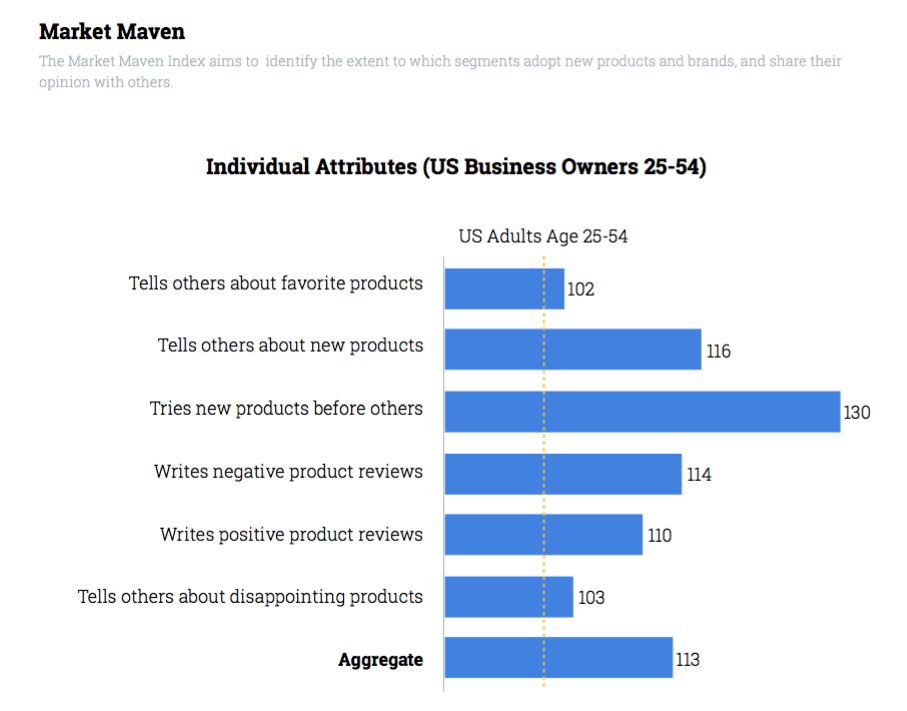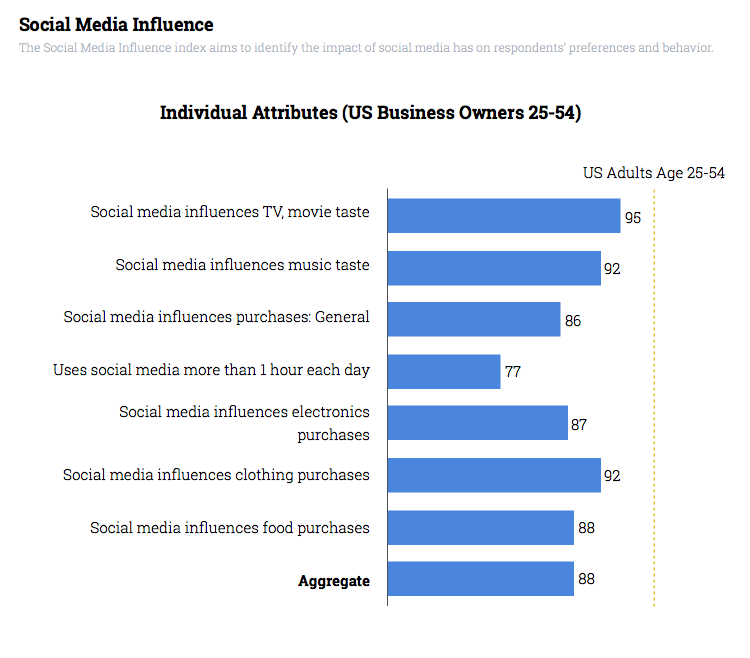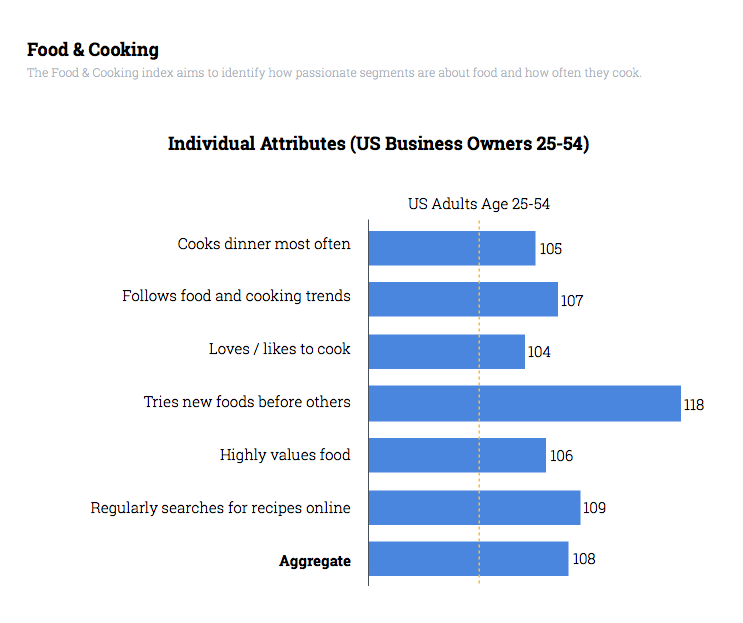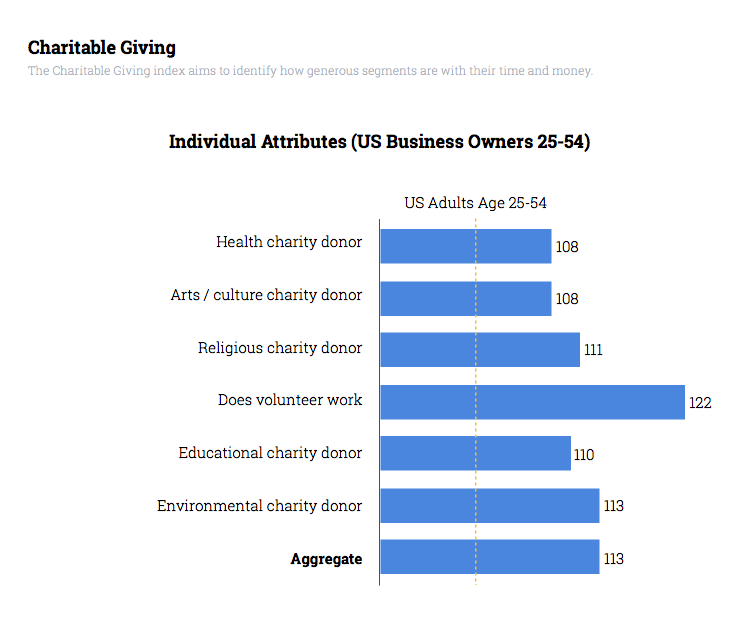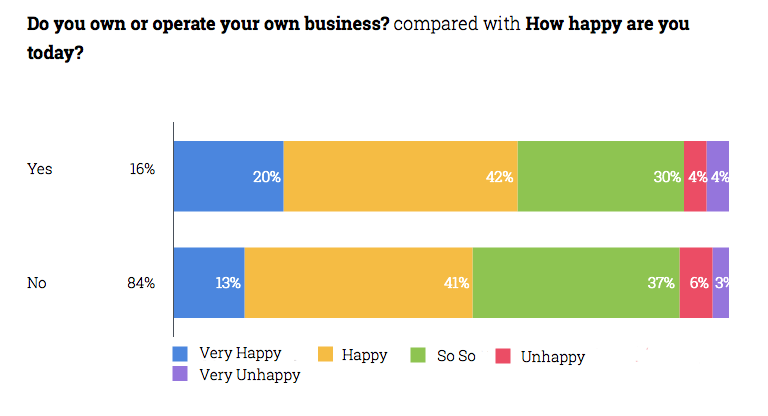*Download the Full Report at the Bottom
Introduction
I started my first company when I was 24 years old. Unlike many of my business- owning peers, it wasn’t a childhood dream or something I even prepared for in college (though I wish I had). I simply had an idea, one that I couldn’t shake, and one that only grew more seductive when I found a business partner who believed in it as much as I did. We left decent jobs, a predictable career path, and a guaranteed income to start a company from scratch. We had no business experience or education, no discernible high-value skills, and even less money.
Still, somehow it worked. Sure, we owe a lot to good (if dumb) luck, good timing, and an immeasurable amount of hard work. But, as I’ve met hundreds of other entrepreneurs in the 18 years since – people of all shapes, sizes, educational backgrounds, and means – I’ve realized there is something in a business-starter’s personality and temperament that distinguishes them from everyone else. I can see it from a mile away, even if I can’t describe it.
Beware, the Entrepreneur
Friends often ask me if I would be willing to meet and counsel an aspiring business-starter they know. I always say yes (I have a lot of past generosity in my career to pay forward) and I always do it at the local coffee shop by our office. And I can almost always tell, before I finish my coffee, whether the person I’m meeting has the necessary screws loose to give it a go. It doesn’t mean I can tell if they’ll be successful. If I could, I wouldn’t be flying commercial. I can just sense whether they have the combination of courage, humility, commitment, and some degree of blissful ignorance and flexibility to see it through.
I’m not just talking about the stereotypical entrepreneurs in tech, professional services, or other trendy businesses you’d find in an urban, shared working space. My cousin Bob owns the only restaurant, catering business, and food truck in a tiny Western Pennsylvania town of less than 1,000 people. He never got an MBA, didn’t grow up in the restaurant business, and didn’t buy into an entrepreneurship-in-a- box franchise. Yet, he’s perhaps the most entrepreneurial person I know.
I’m also not suggesting that entrepreneurs are better than anyone else – far from it. I know far too many people who failed miserably, wrecked their finances and their families, and had to work well into their golden years to make up for it. We tend to be overly self-centered, stubborn, and aloof in our other personal responsibilities. I would think twice before marrying an entrepreneur. My wife is a saint.
Business-Owner Big Data
Given my fascination with this subject, I am quite lucky to have the access at CivicScience that I do. Since 2011, we have polled over 88,000 people in our database who own and/or operate their own business. They’ve given millions of answers to thousands of different questions about their likes, dislikes, lifestyle, media habits, personality, and much more. We can compare them to their non- business-owning peers, on near-countless dimensions, and find the things that make them most different. We can see trends over time.
So, I recently embarked on an extensive study – comparing these business owners to the general U.S. population – to add some quantitative backing to my personal experience with the entrepreneurial cohort. I hope you find it as interesting as I did.
About This Research
The following is a brief synopsis of analysis conducted by CivicScience on 23,795 U.S. adults who own and/or operate their own business. These individuals were analyzed across hundreds of dimensions ranging from their demographics, to their media consumption, shopping behaviors, lifestyles, and much more. The goal was to identify the ways in which entrepreneurs differ from non-entrepreneurs. What we found was an interesting mix of surprises and common sense validation.
Who We Studied
Anytime we engage in comparative research like this, our biggest fear is that all of our findings will stem from one or two demographic “proxies” that explain all of our differences. For example, if we wanted to compare people who use Snapchat to the general population, the majority of our findings would simply relate to the fact that Snapchat users are younger. That’s not very interesting. Instead, we need to use sampling and statistical techniques to prevent that from happening when we can.
For this study, I made two decisions (either of which is arguable, but it’s my company, so whatever): First, I constrained our sample only to business owners and non-business owners between the ages of 25 and 54. Why? Because older business owners, many of whom are phasing out of their business operations, and those in their teens, who may believe that their grass-cutting gig qualifies, look nothing like those who are in the rush hour of their lives. This brings our sample of business owners down to 23,795, still a sizable number for analysis.
Second, we reweighted our numbers – within that age group – by gender. Despite a lot of progress in recent years, women still represent only about a third of U.S. private business owners. Thus, our initial unweighted results merely yielded a bunch of gender-related differences. By multiplying our number of female respondents to line up with the Census, we were better able to contrast entrepreneurs, apples-to-apples, with the rest of the U.S. population.
What We Found
This link will take you to a PDF file of what we call a DeepProfileTM report, including category-by-category graphs, scales, and full results for most of the larger topic areas we studied. Check it out if you want. Otherwise, here are the Cliff’s Notes:
DEMOGRAPHICS
No surprise, rates of entrepreneurship increased with the age of respondents. Business owners were less likely between age 25 and 34 and most likely between 45 and 54. Entrepreneurs are slightly more likely to be Parents/Grandparents, and to own their own home (see: Age Proxy).
Likewise, rates increased with rising income, though not as dramatically as we might expect. People making between $25-50k per year (18% of all entrepreneurs) make up only 1% less of the business owner group than those making over $150k (19% of all entrepreneurs).
Rates of entrepreneurship correlated with education level, but only barely. 39% of US adults in our age group have a bachelor’s degree and only 38% of entrepreneurs. 34% of entrepreneurs never completed college. Business owners were, however, much more likely than average to have a graduate degree. They’re also 24% more likely than non-owners to have an undergraduate degree in Business.
One finding that did surprise me: Entrepreneurship was more common in rural areas, less so in urban ones. Perhaps because there are less corporate centers in rural towns, more people turn to self-employment.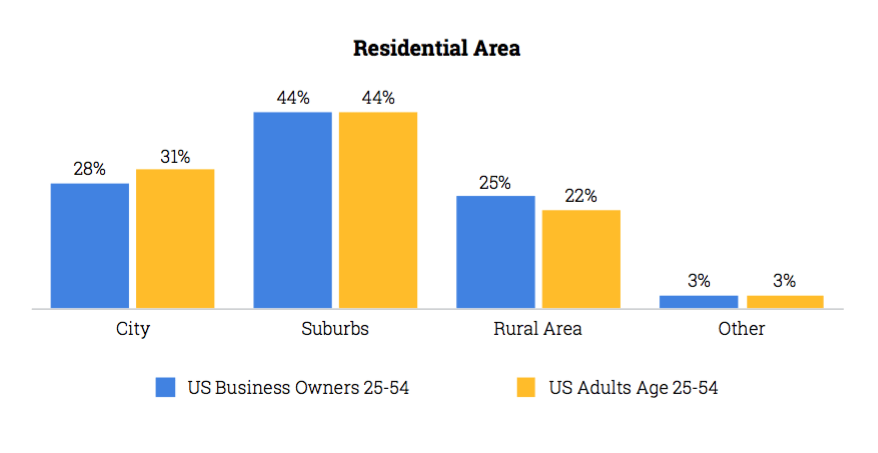 SHOPPING AND FINANCES
SHOPPING AND FINANCES
Entrepreneurs are much more likely than the general public to be what we call “Market Mavens.” It means that they are more likely to try new products and technologies before others; and tell people about it – either directly or via product reviews. They also consult online reviews before buying. They’re much less likely to be price conscious, in every area other than household products.
Entrepreneurs are more likely than other 25-54-year-olds to favor locally-owned establishments but NOT socially-conscious ones. They’re much more likely to say they manage their money “very well,” closely follow the markets, and monitor their retirement savings. They’re much LESS likely to use a mobile device for banking.
TECHNOLOGY AND SOCIAL MEDIA
Entrepreneurs are less likely to be users of most social media platforms, with the lone exception of Twitter. As such, they are much, much less likely to be influenced by their friends on social media in every area other than TV and movies, where the difference is only slight.
Overall, entrepreneurs and non-entrepreneurs are equally tech-savvy, but in very different ways. Our business owners over-index in terms of following technology trends and in adopting new technologies like augmented reality and smart home products. They are less likely, conversely, to own a smart watch or to consider themselves “addicted” to their digital device.
ENTERTAINMENT AND SPORTS
When it comes to entertainment technology, entrepreneurs over-index as users of eReaders and wireless speaker systems. But they’re less likely than their non- entrepreneur peers when it comes to streaming music or TV/videos, particularly via Netflix.
Those differences can be largely attributed to the fact that entrepreneurs watch less television than others. They only over-index significantly as Documentary fans, while vastly under-indexing in the Sitcom and Drama department.
Entrepreneurs do rank higher than non-entrepreneurs as sports fans, particularly when it comes to Major League Baseball, the NHL, and NCAA football. They’re also more likely to attend sporting events.
HEALTH AND LIFESTYLE
One of the biggest disparities we found between business owners and non-owners were their attitudes and behaviors around health and wellness. Entrepreneurs are noticeably more likely than non-entrepreneurs to exercise, not smoke, take vitamins or nutritional supplements, and value health and fitness overall.
Entrepreneurs are also more likely to be passionate about food and cooking. They cook dinner most often in their homes, search for new recipes online, and follow food and cooking trends.
Entrepreneurs are also more likely to dine out, though they’re pickier about when and where they do it. Our business owner respondents, unsurprisingly, are more likely to eat out for lunch, eat at upscale restaurants, and order take-out. They’re less likely to eat at casual, fast-casual, or quick-service restaurants.
SOCIAL AND ENVIRONMENTAL CONSCIOUSNESS
Entrepreneurs significantly over-index as charitable givers – even though their income isn’t significantly higher. They donate to causes of all kinds more than non-entrepreneurs and even do volunteer work at a much higher rate.
This socially-conscious streak can be found particularly in environmental areas. Entrepreneurs are more likely to buy environmentally-friendly products, use reusable shopping bags, and eat locally grown, and organic foods.
MISCELLANEOUS
You won’t find these in the PDF report because I did some extra, manual digging on my own. Here are a few interesting stats I uncovered.
Entrepreneurs are more likely than non-entrepreneurs to:
• Have an UNFAVORABLE view of Amazon
• Choose an Import beer over domestic or craft beers
• Live in the U.S. West or U.S. South, not the U.S. Northeast
• Use AT&T as their wireless carrier
• Value performance, design, and technology when buying a car
• Contribute to political candidates or parties
• Live in a household with someone who has heart disease
• Have either zero siblings or 4 or more
PERSONALITY TYPE
Finally, I looked at a series of questions in our database relating to things like personality type, cognitive attributes, and overall happiness – attempting to trace them back to my personal observations. Here’s what I found:
Entrepreneurs are more likely than non-entrepreneurs to like keeping their plans flexible, as opposed to making plans and sticking with them (business folks call this “pivoting”). They’re more likely to make decisions objectively, not based on how they feel or how others will be affected. When making major decisions, however, entrepreneurs like to keep their options open, as opposed to having things settled.
When discussing touchy issues, entrepreneurs are more straight-forward and direct, versus sensitive and diplomatic. And when someone is trying to convince them of something, they are more persuaded by logical, not emotional arguments.
OVERALL HAPPINESS
Despite all of those differences between entrepreneurs and non-entrepreneurs, they don’t necessarily end up in different places. We already touched on the fact that income varied only slightly between the two groups. Marriage and divorce rates were virtually identical. When we looked at corresponding levels of reported stress, no group was better off than the other.
But when we whittled it all down to one important question in our database, however, here is what we discovered:
Business owners are more likely than non-owners to say they are “Very Happy” in their lives. Perhaps they’re happier because they don’t have a boss breathing down their necks or because they get to hand-pick their own coworkers. Or maybe it’s because they’re chasing a dream. Or maybe it’s just because you need to be a blissfully ignorant fool to start a business in the first place. We don’t have the data to answer that question.
CONCLUSION
I suppose none of these findings fully confirmed or refuted my personal observations about entrepreneurs, other than the fact that they’re a different breed of cat. Age, education level and income are factors but not major ones. It doesn’t matter so much where they live. Business-starters have different shopping, media, technology, entertainment, and lifestyle attributes. Some of these may be a cause of entrepreneurship; some might be an effect.
Entrepreneurs do have a consistent personality type – unemotional and objective (perhaps “heartless”) in their decision-making, direct (see: “confrontational”) in their communications, and flexible and open-minded (ie. “flaky”) in their planning. Maybe these are the things I can sense in a 30-minute meeting with someone over coffee. Takes one to know one, I guess.
In the end, happiness is what counts. Entrepreneurship surely isn’t the only path but it’s a great one if you can take it. Just ask yourself this question: If you fit the entrepreneurial profile I outlined above, you’re at a stage in your life when you can do it, and you have an idea that won’t leave you alone, what are you waiting for?
